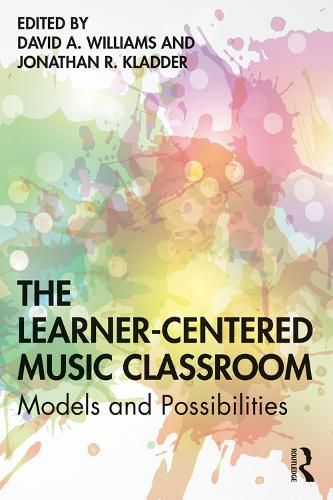Readings Newsletter
Become a Readings Member to make your shopping experience even easier.
Sign in or sign up for free!
You’re not far away from qualifying for FREE standard shipping within Australia
You’ve qualified for FREE standard shipping within Australia
The cart is loading…






The Learner-Centered Music Classroom: Models and Possibilities is a resource for practicing music teachers, providing them with practical ideas and lesson plans for implementing learner-centered pedagogical concepts into their music classrooms. The purpose of this book is to propose a variety of learner-centered models for music teaching and learning through the use of a variety of autoethnographic viewpoints. Nine contributors provide working and concrete examples of learner-centered models from their classrooms. Offering lesson plan ideas in each of these areas, the contributors provide practical approaches for implementation of learner-centered approaches in music instruction across a variety of landscapes.
Learner-centered teaching provides an approach to music education that encourages social, interactive, culturally responsive, creative, peer-based, open-formed, facilitated and democratic learning. Chapter 1 defines the what, why, and perceived benefits of learner-centered approaches in music teaching and learning contexts Chapters 2-10 will include example lesson plans, rubrics, etc. as models for teachers. The contributors to this book suggest that learner-centered approaches, when embedded into the culture and curricular framework of a music classroom, offer exciting approaches for teaching music in ways that are culturally and educationally appropriate in contemporary education.
$9.00 standard shipping within Australia
FREE standard shipping within Australia for orders over $100.00
Express & International shipping calculated at checkout
The Learner-Centered Music Classroom: Models and Possibilities is a resource for practicing music teachers, providing them with practical ideas and lesson plans for implementing learner-centered pedagogical concepts into their music classrooms. The purpose of this book is to propose a variety of learner-centered models for music teaching and learning through the use of a variety of autoethnographic viewpoints. Nine contributors provide working and concrete examples of learner-centered models from their classrooms. Offering lesson plan ideas in each of these areas, the contributors provide practical approaches for implementation of learner-centered approaches in music instruction across a variety of landscapes.
Learner-centered teaching provides an approach to music education that encourages social, interactive, culturally responsive, creative, peer-based, open-formed, facilitated and democratic learning. Chapter 1 defines the what, why, and perceived benefits of learner-centered approaches in music teaching and learning contexts Chapters 2-10 will include example lesson plans, rubrics, etc. as models for teachers. The contributors to this book suggest that learner-centered approaches, when embedded into the culture and curricular framework of a music classroom, offer exciting approaches for teaching music in ways that are culturally and educationally appropriate in contemporary education.